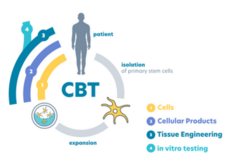Dechema research scholarship to investigate cell-free therapies
For the therapy of degenerative diseases and for the stimulation of regenerative processes extracellular vesicles (EVs) are in the focus.
Within the last years, a lot of cell therapies were developed which promised high potential. Stem cell treatment was considered to stop the course of tissue degeneration and initiate its regeneration until full recovery of organs and their functions. However, many stem cell therapies prove to be inefficient and even autologous (patient-derived) stem cells could imply unpredictable risks such as rejection or tumorigenic degeneration.
During the investigation of interactions and mechanisms of cell therapies it was discovered that (stem) cell derived EVs are a major player in signal and information transduction for tissue regeneration. EVs transmit biologically active molecules such as proteins, lipids, or RNAs from stem cells to harmed cells and thereby convey therapeutic effects.
The cell-free treatment with EVs is a promising alternative to cell therapy, which might be more effective, safer, and cheaper. Nevertheless, as the efficiency of stem cell therapy is dependent on the condition of the applied cell, the applicability and cargo of the vesicles are dependent on the derived cell type and its environmental influences during production. The culture conditions of the producing cells have direct impact on the cargo and thereby the biological effect and the therapeutic potential of the EVs.
To further determine the influence of distinct culture conditions on cargo and efficiency of EVs, the German Society for Chemical Engineering and Biotechnology (Dechema) supports the research of Dr. Sebastian Kreß with the Max Buchner research scholarship.
For the scholarship, mesenchymal stem cells (MSCs) isolated from fat and umbilical cord will be utilized. MSCs exhibit a high therapeutical potential proven by dozens of clinical studies. Moreover, there are plenty of indications that mainly MSC-derived EVS are responsible for the transmission of therapeutic effects. They convey communication and signal transduction and thereby impact the metabolism of the target cell. However, stem cells lose most of their capacity during standard in vitro cell culture conditions, which in turn effects the efficacy of regenerative therapies. Thus, it is critical to mimic the in vivo situation. Consequently, within this project primary stem cells isolated from patient derived biopsies will be cultured under physiologic conditions to preserve the in vivo functionality. Therefore, the impact of oxygen saturation (normoxia and hypoxia), 3D culture, as well as static and dynamic conditions will be investigated. To proof the biological functionality the EVs will be applied on endothelial cells for wound healing and tube formation assays.
The results of this study will determine an indication on the impact of critical process parameters on the functionality and efficacy of EVs. This will provide a substantial foundation and contribute to further studies aiming towards the application of EVs as cell-free therapeutic.
In case of questions:
Dr. Sebastian Kreß
DBT - Institute for Cell and Tissue Culture Technologies
Email: sebastian.kress@boku.ac.at

